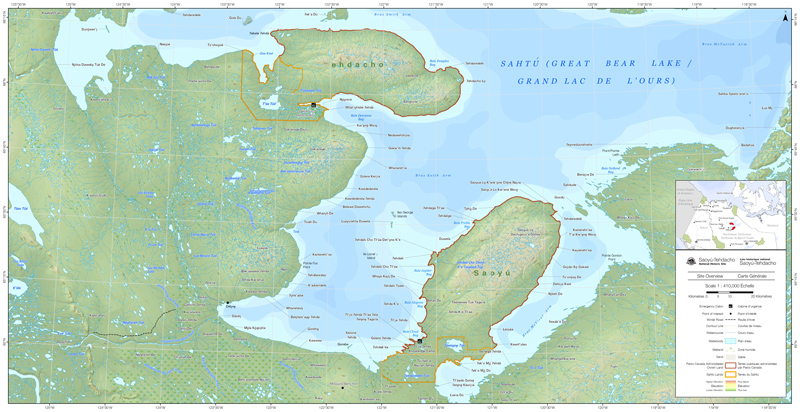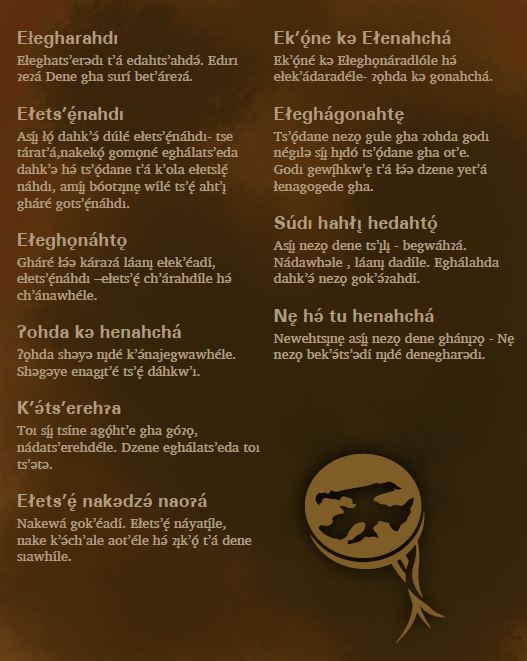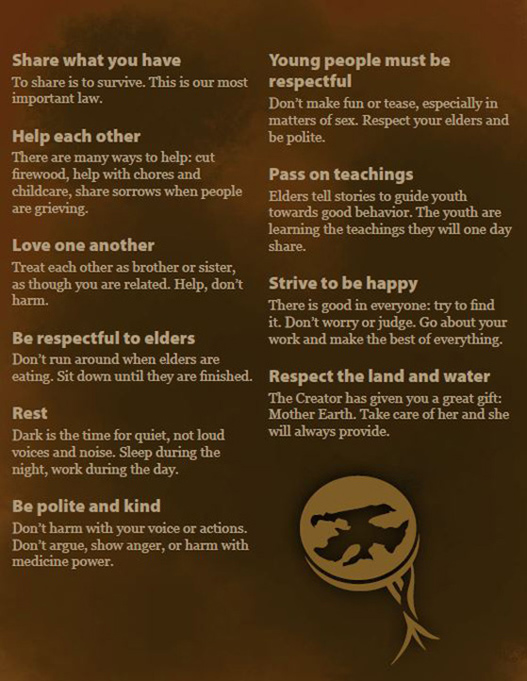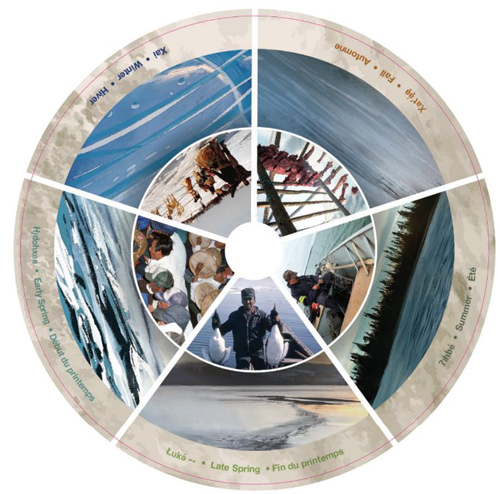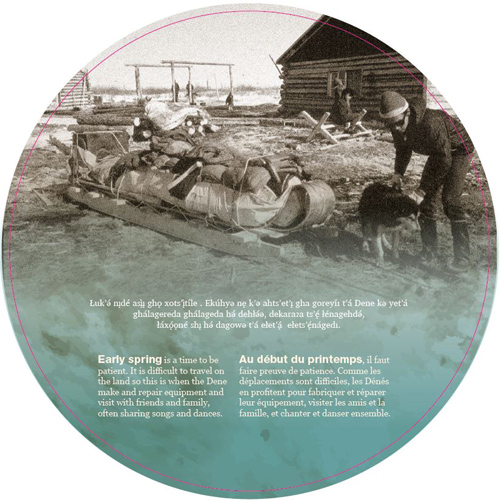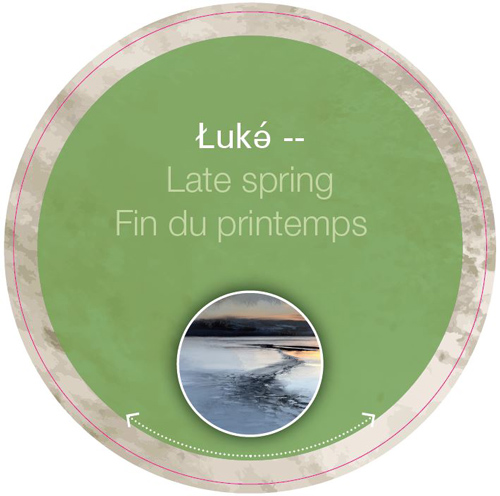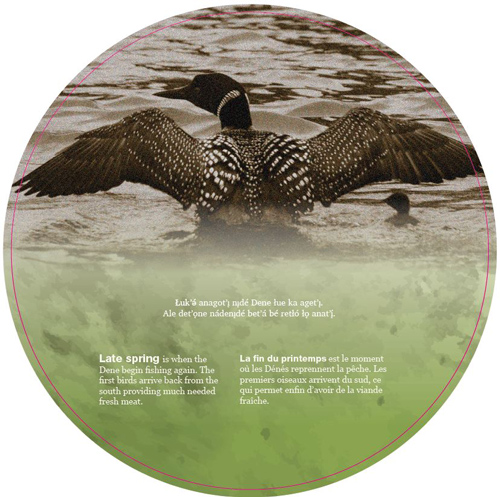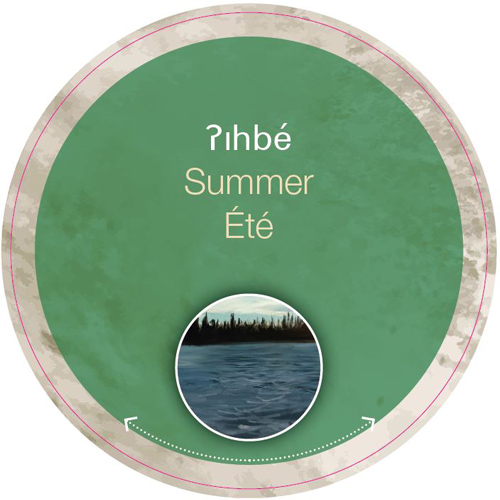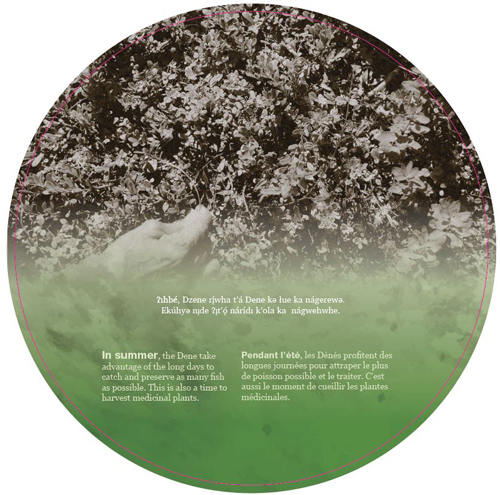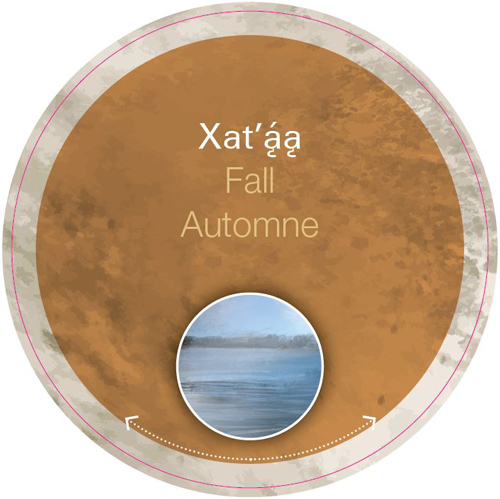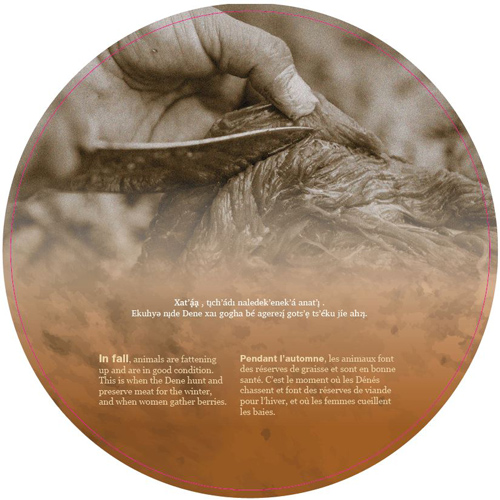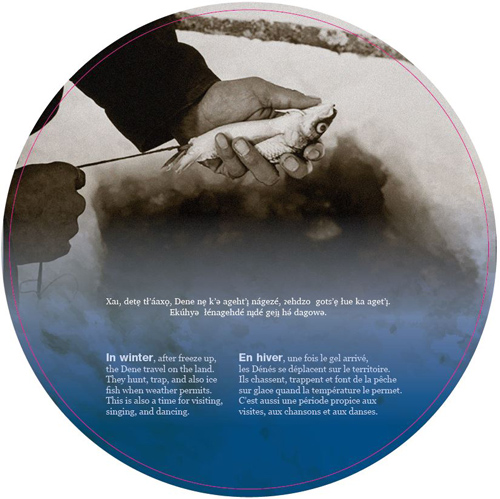
Denecho Knowledge Centre Exhibit
Saoyú-ʔehdacho National Historic Site
Welcome to the Digital Denecho Knowledge Centre Exhibit
The Denecho Knowledge Centre Exhibit is located in Délı̨nę in the Traditional Knowledge Centre. The exhibit’s vision is to share Sahtúgot’ı̨nę values, culture, history, and traditions. We hope you learn something new about Sahtúgot‘ı̨nę culture and ways of life during your visit.
Timeline
1921
Treaty 11 Sahtú Dene hǝ́ ekúu nę ts’ę́ k’áode kǝ ɂerᶅhtł’é k’ǝ dezí négenᶅla.
Treaty 11 signed between the Sahtú Dene and the Crown.
1993
Sahtú Dene, Government of Canada hǝ́ nę gha ɂerᶅhtł’é dezí négenᶅɂǫ.
Sahtú Dene sign a land claim agreement with the Government of Canada.
1997
Saoyú hǝ́ Ɂehdacho bekǝ́ts’ǝdí ajá.
Designation of Saoyú-ʔehdacho (Grizzly Bear Mountain and Scented Grass Hills) National Historic Site.
2008
Délı̨nę Land Corporation, Délı̨nę Kǫ́k’ǝ́dı gok’ǝrǝ́hkw’I gots’ę Parks Canada, Saoyú-Ɂehdacho gha dezí ɂerᶅhtł’é k’ǝ négenᶅla sį́ı̨ yekǝ́gedı gha ɂerı̨htł’é wechu ajá.
The Déline Land Corporation, the Déline renewable Resources Council and Parks Canada sign the Saoyú-ʔehdacho Agreement, which provides for protection and cooperative management.
2013
Sahtú Secretariat Inc. hǝ́ Government of Northwest Territories gots’ę Canada, Sahtú néné gha ɂeɂá weɂǫ agį́la.
The Sahtú Secretariat, Inc. and the governments of the Northwest Territories approve the Sahtú Land Use Plan.
2016
Tsá Túé k’ǝ asį́ı̨ guhdí hǝ́ yánį́ye ye’ǝ́gehdí gha godı nį́gı̨chú.
Tsá Tué Biosphere created.
Délı̨nę Got’ı̨nę Government kǝ́genį́whe, asį́ı̨ gha káowe hohłǝ́ gha.
Déline Got'ine Government begins operation, recognizing self-government.
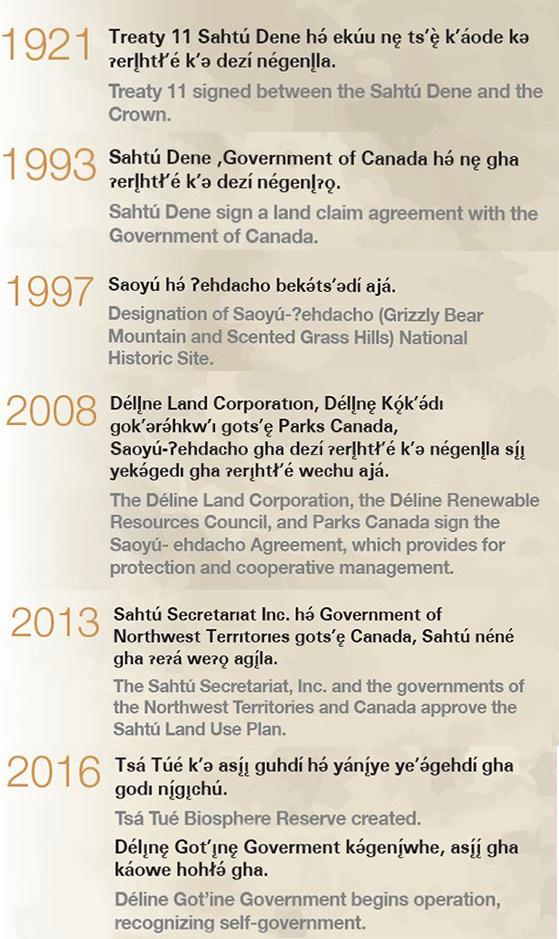
Dene ʔeʔá (Laws)
Dene
Ełegharahdı
Ełeghats’erǝdı t’á edahts’ahdǝ́. Edırı ɂeɂá Dene gha surí bet’áreɂá.
Ełets’ę́nahdı
Asį́ı̨ łǫ́ dahk’ǝ́ dúlé ełets’ę́náhdı- tse tárat’á,nakekǫ́ gomǫné eghálats’eda dahk’ǝ hǝ́ ts’ǫ́dane t’á k’ola ełetslę́ náhdı, amį́ı̨ bóotɂı̨nę wilé ts’ę́ aht’ı̨ gháré gots’ę́náhdı.
Ełeghǫnáhtǫ
Gháré łǝ́ǝ káraɂá láanı̨ ełek’éadí, ełets’ę́náhdı ¬–ełets’ę́ ch’árahdíle hǝ́ ch’ánawhéle.
Ɂohda kǝ henahchá
Ɂǫhad shǝyǝ nı̨dé k’ǝ́najegwawhéle. Shǝgǝye enagı̨t’é ts’ę́ dáhkw’ı.
K’ǝ́ts’erehɂa
Toi sį́ı̨ tsíne agǫ́ht’e gha góɂǫ, nádats’erehdéle. Dzene eghálats’eda toı ts’ǝtǝ.
Ełets’ę́ nakǝdzǝ́ naoɂá
Nakewá gok’éadí. Ełets’ę́ náyatį́le, nake k’ǝ́ch’ale aot’éle hǝ́ ɂı̨k’ǫ́ t’á dene sıawhíle.
Ek’ǫ́ne kǝ Ełenahchá
Ek’ǫ́né kǝ Ełeghǫnáradlóle hǝ́ ełek’ádaradéle- ɂǫhad kǝ gonahchá.
Ełeghágonahtę
Ts’ǫ́dane nezǫ gule gha ɂohad godı négılǝ sį́ı̨ hı̨dó ts’ǫ́dane gha ot’e. Godi gewį́hkw’ę t’á łǝ́ǝ dzene yet’á łenagogede gha.
Súdı hahłı̨ hedahtǫ́
Asį́ı̨ nezǫ dene ts’ı̨lı̨ - begwáhɂá. Nádawhǝle , láanı̨ dadíle. Eghálahda dahk’ǝ́ nezǫ gok’ǝ́ɂahdí.
Nę hǝ́ tu henahchá
Newehtsı̨nę asį́ı̨ nezǫ dene ghánı̨ɂǫ - Nę nezǫ bek’ǝ́ts’ǝdí nı̨dé denegharǝdı.
English
Share what you have
To share is to survive. This is our most important law.
Help each other
There are many ways to help: cut firewood, help with chores and childcare, share sorrows when people are grieving.
Love one another
Treat each other as brother and sister, as though you are related. Help don't harm
Be respectful to Elders
Don't run around when Elders are eating. Sit down until they are finished.
Rest
Dark is the time for quiet, not loud voices or noise. Sleep during the night, work during the day.
Be polite and kind
Don't harm with your voice or actions. Don't argue, show anger, or harm with medicine power.
Young people must be respectful
Don't make fun or tease, especially in the matters of sex. Respect your Elders and be polite.
Pass on teachings
Elders tells stories to guide youth towards good behavior. The youth are learning the teachings they will one day share.
Strive to be happy
There is good in everyone: try to find it. Don't worry or judge. Go about your work and make the best of everything.
Respect the land and water
The Creator has given you a great gift: Mother Earth. Take care of her and she will always provide.
Dene Eghelé (Drum)
Dene
Eghele sį́ı̨ Dene náowere ǫt’e.
Eghele t’á dene łǝ́ə nats’ilé, ediri néné bedáiyı̨né gots’ę nę k’ola gha ǫt’e.
Eghele dats’ahʔa sį́ı̨ bet’á edetets’ereʔı̨ne, gǫná dene hǝ́ nę dats’ihtǫ́.
Eghele náwekw’ę hǝ́ ʔǫhda dekədə t’á dene ts’ę́ gogede.
Tł’u nákə ełeghǫzá nı̨t’u kúlú Dene kə yet’á nágetse.
English
It is said that the drum is the Dene culture.
The drum represents unity of self, others, the spiritual world, and the land.
The Dene must grasp the drum and be in respectful relationship with themselves, with others, and with Mother Earth.
To grasp the drum is to maintain integrity and to live life to its fullest.
The drum is the voice and the language of the Elders speaking to the Dene.
Two strings, side by side and yet apart, work together like the Dene to amplify the voice of the Elders.
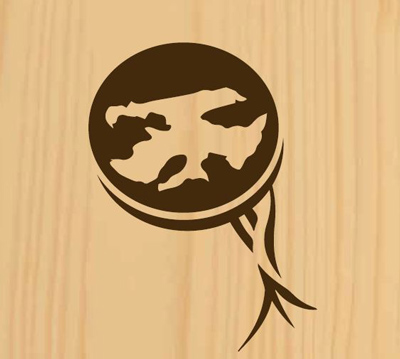
Land provides
Dene
Dene néné, Bet’á gohts’idí
Dene kə nę k’ə xálagerįdá sį́į areyǫne nę k’ə asį́į guhdí surí xegenįhchá. Nę, Tu, Yat’á dene gharədi.
Dene xái
Dene nádǝ́, názé gots’ę nę k’ə k’ǝ́nagahdǝ́, nę k’ə gúlú agoht’į xeogəhdi. Hįdú ayíi tįch’ádi gǫ́hłiɂ ɂįt’ǫ́ dáįt’e yáníyǝ́ɂ dágǫ́ht’eɂ k’ǝ́gerezhǫ.
English
Our Land, Our Survival
The Dene people have lived off the land for thousands of years and have great respect for all of creation. They believe that everything in nature is connected.
The Dene Year
As the Dene live, hunt, and travel on the land, they are always alert to changes in their environment. How is the weather? What animals are present? Which plants are growing? They recognize five seasons.
Hı̨dohxae
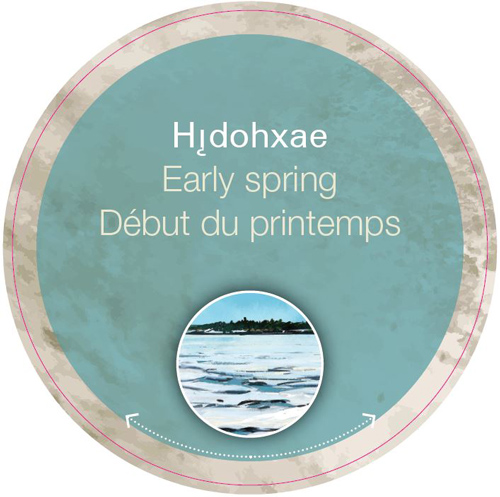
Hı̨dohxae
Łuk’ǝ́ nı̨dé asį́ı̨ ghǫ xots’į́tíle. Ekúhyǝ nę k’ǝ ahts’et’ı̨ gha goreyú t’á Dene kǝ yet’á ghálagereda ghálageda hǝ́ dehłǝ́ǝ, dekaraɂa ts’ę́ łénagehdǝ́, łáxǫ́ǫné shı̨ hǝ́ dagowǝ t’á ełet’ą́ ełets’ę́nágedı.
Early Spring
Early spring is a time to be patient. It is difficult to travel on the land so this is when the Dene make and repair equipment and visit with friends and family, often sharing songs and dances.
Łukǝ́ –
Ɂıhbé
Xat’ą́ą
Xai
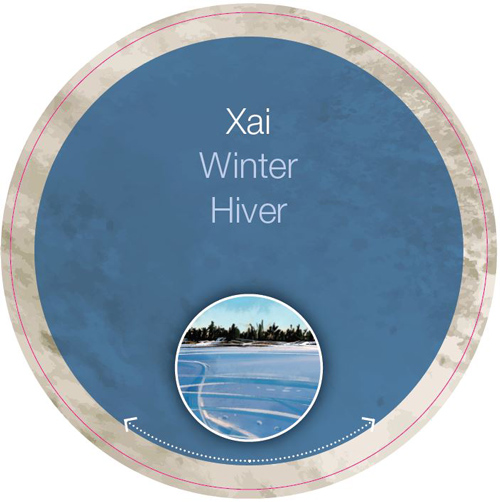
Xai
Xai, detę tłáaxǫ, Dene nę k’ǝ ageht’ı̨ nágezé, ɂehdzo gots’ę łue ka aget’ı̨. Ekúhyǝ łénagehdé nı̨dé gejı̨ hǝ́ dagowǝ.
Winter
In winter, after freeze up, the Dene travel on the land. They hunt, trap, and also ice fish when weather permits. This is also a time for visiting, singing, and dancing.
Related links
- Date modified :
